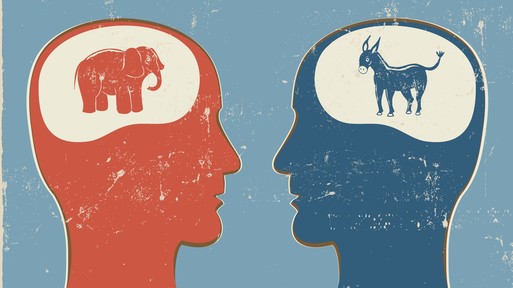‘With partisanship and polarization holding center stage, the question becomes: What exactly are we talking about when we talk about partisanship and polarization?’ Thomas B. Edsall asks in The New York Times.
One answer he gives:
‘In “Compound Political Identity: How Partisan and Racial Identities Overlap and Reinforce,” Westwood and Peterson argue that “partisanship and race are so enmeshed in the minds of citizens that experiences which involve only one of the two groups affect evaluations and behavior toward both” — or, put another way, that “views of partisan and racial out-groups are inextricably connected.”
In a series of experiments, Westwood and Peterson found that affective polarization — defined as intense partisan animosity or the tendency “to view opposing partisans negatively and copartisans positively” —
is not merely the consequence of a growing sense of partisanship as it is a social identity or a greater alignment between other social identities and partisanships.
Instead, they argue, affective polarization
contributes to racial animosity. To understand affective polarization along partisan lines, our results suggest, requires us to consider partisanship and race not only as related groups but as inseparable in the minds of Americans.’
Aha, partisanship and race appear to be inseparable. If you cannot stand the liberals probably you cannot stand the BLM-movement either.
Whoever touches my dislikes touches my identity.
Edsall again:
‘What had been differences over deeply rooted moral convictions, along with such personality traits as openness to experience and the need for closure — which were once distributed in roughly equal proportion among members of the two parties — have become engines of polarization, driving the two parties further apart into warring camps.
The formulation of what has come to be known as moral foundations theory has been crucial to a deeper understanding of this process. The theory
proposes that the human mind is organized in advance of experience so that it is prepared to learn values, norms, and behaviors related to a diverse set of recurrent adaptive social problems.
Leading proponents argue that there are
five foundations of intuitive ethics: care/harm; fairness/cheating; loyalty/betrayal; authority/subversion; and sanctity/degradation.
The theory is described in detail in “Moral Foundations Theory: The Pragmatic Validity of Moral Pluralism,” a 2013 paper by Jesse Graham of the University of Utah; Jonathan Haidt of N.Y.U.; Sena Koleva, a research consultant; Matt Motyl of the University of Illinois at Chicago; Ravi Iyer, chief data scientist for Ranker, a consumer internet platform; Sean P. Wojcik, a senior data scientist at the news site Axios; and Peter H. Ditto, of the University of California-Irvine.
What makes moral foundations theory especially relevant now is that in recent decades liberal and conservative partisans have divided over the importance they place on these five moral foundations:
Liberals valued Care and Fairness more than did conservatives, whereas conservatives valued Loyalty, Authority and Sanctity more than did liberals.
These differences mattered little for politics when both parties included liberals and conservatives, but beginning around 1964, this disagreement between left and right on moral values began to coincide more strongly with party affiliation.’
Morality as a matter of political affiliation is an open invitation to culture wars.
But: ‘In “Predisposed,” Smith and John Hibbing and John Alford, his co-authors, stress “that we are not making a nature versus nurture argument.”
Instead, they write, “innate forces combine with early development and later powerful environmental events to create attitudinal and behavioral tendencies.” A predisposition can be altered. Nonetheless,
predispositions nudge us in one direction or another, often without our knowledge, increasing the odds that we will behave in a certain way, but leaving plenty of room for predispositions to be contravened.
Kevin Arceneaux, a political scientist at Temple, stressed in an email that
It is important to resist the tendency to see heritability of eye color, for example, as the same thing as the heritability of an attitude. I cannot change my eye color, but I can change my attitudes.
Some of the most interesting work in the field of behavioral genetics, Arceneaux continues, shows how
context interacts with genetic influences. If you change the context, the heritability of behavioral constructs changes. So, I would caution against drawing a straight line from heritability to unchanging/intractable.
Along the same lines, Yuan Chang Leong, a postdoctoral fellow in the psychology department at Berkeley, emailed me that
“What is heritable is unlikely to be ideology per se, but something more akin to personality traits or a predisposition to respond to certain information in a particular way.”
The relationship between these factors and policy positions, Leong continued,
“are not set in stone. There is evidence that partisans can be persuaded by political messages, especially when the messages are framed in a manner that appeals to them, so efforts at persuasion are not futile.’
Persuasion is not by definition futile, and free will somehow exists: ‘A predisposition can be altered.”
This is what some people will call hope: waiting for a predisposition to be altered.
Read the article here.
